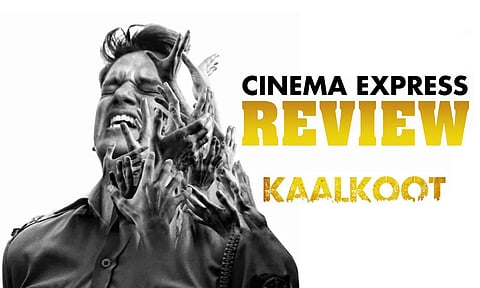Kaalkoot Series Review: An efficient Vijay Varma anchors this effective crime drama
Rating:(3 / 5)
It is not often that we see a cop being not hypermasculine in our films and series. Even if he is forced to be less of a macho person due to higher officials, there are often moments where we know the hypermasculinity is still raging, and it finds avenues to explode. In Kaalkoot, we first see Inspector Ravi (a terrific Vijay Varma), wanting to resign from the police force due to his disllusionment with the system. Soon after, he is admonished in public by a top cop in front of his peers and seniors. Soon after, he is humiliated by his senior cop Jagadish (Gopal Dutt) for not even knowing how to climb a ladder with bravado. He wears a shoulder bag. He doesn't know how to talk to women. He cannot stand up for himself. He is a meek, naive, cowardly cop. Over the course of eight episodes, Kaalkoot, which is essentially the coming-of-age story of Ravi, has him solving the case of an acid attack on a young woman, understand the prevalent patriarchy and his own place in the system, and turn into a confident, smart, and sensitive cop, who realises his hypermasculinity is just a push away.
Director: Sumit Saxena
Cast: Vijay Varma, Shweta Tripathi Sharma, Seema Biswas, Yashpal Sharma, Gopal Dutt
The initial beats of Kaalkoot are very familiar to the police procedurals set in non-metros. There is the understanding and experienced cop, Constable Yadav (Yashpal Sharma). There is the no-nonsense senior, Jagadish. And political interventions that don’t allow the cops to do their duty. However, the writing is smart and lets us stew in the exact portions the makers want us to. There are multiple detours that act as an effective smokescreen to the central conceit, and it is impressive how the smoke clears only when the writing intends it to. Be it the detours into phosphorous content in the waters of the area or red herrings in terms of possible suspects or the power and impact of social media and fake trolls, most of these detours aren’t just plot pushers, but present interesting questions too. Such control over the narrative is really effective when the investigation isn’t groundbreaking, and it is the human emotions that drive the story forward.
Through the story of Parul (a restrained but supremely effective Shweta Tripathi), who spends most of the series in the hospital recuperating from the acid attack, we are confronted by the dark webs of our society. The rumours, the misconceptions, the easy adorning of the scarlet letter on people we can’t ‘get,’ and a lot more. As the story unravels, we see society’s ugly face bolstered by liberal doses of misogyny and patriarchy bared out for all to see. Interestingly, Parul’s character isn’t painted as a Miss-Goody-Two-Shoes. She has her share of grey shades, just like everyone else, and it makes us question our internal biases. Does our empathy shift goalposts when we know the survivor isn’t ascribing to the ‘standards’ of society? It is a terrific insight that plays out through the viewpoints of the cops, and in turn, ours. There is a beautiful scene where Yadav undergoes a change of heart after seeing the plight of Parul. While a previous outburst of his is ‘morally right’ to his own set of principles, the writing doesn’t let him without a question against it.
Kaalkoot reminds us of our own grey shades, and it never shies away from asking uncomfortable questions. We see domestic violence happening, and how it is never questioned if the proof is right in front of our eyes. We see how an otherwise upright and decent man doesn’t shy away from using someone else’s guilt as a way to exercise his superiority. We see how ‘shame’ is weaponised by people who think they are God or even worse… the upholders of moral justice in this godforsaken society.
Although the series starts with what happens to Parul, and continues to revolve around the crime committed against her, Kaalkoot is more about the poison that has injected itself into the veins of our society. While the intentions cannot be faltered, the same cannot be said about indulgence. We see a lot more things happening, and after a point, it does become rudderless. There are many angles that hit us one after another without giving us much-needed breathing space. The narrative goes off-kilter at these places and takes the focus away from the investigation, meanders quite a bit, and finally ties it all together, but it doesn't have the zing the initial portions had.
Nevertheless, Kaalkoot is an effective police procedural that doubles up as a mirror to society at large. It makes us question our own prejudices and puts forth a pertinent question... Who decides what is right and wrong? And more importantly... do we have the antidote for the poison in our society, or is it too late...?

